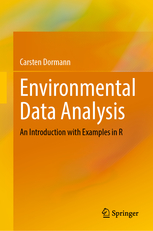Prof. Dr. Carsten Dormann
Carsten Dormann, Prof. Dr.Department of Biometry and Environmental System Analysis phone: ++ 49 761 203-3750 |
(Full) Professor at the University of Freiburg (since 2011)
Habilitation (a somewhat anachronistic rung of the German academic career ladder) at the Agricultural Faculty of the University of Göttingen (2008)
PostDoc and Senior Research Scientist at the Helmholtz Center for Environmental Research-UFZ, Department Computational Landscape Ecology (2002-2011)
PhD in Plant Ecology, University of Aberdeen , under the guidance of Dr. Sarah Woodin and Prof. Dr. Steve Albon (2001)
Diploma (equivalent to an MSc) in Biology, University of Kiel (1996)
Publications
Full list of scientific publications
For the lecture "Statistics" for BSc Environmental Sciences, Forestry and Environment, Geography the textbook (2nd edition 2017): Daten zum Buch | Errata zur 2. Auflage
Apppendix with "a less mathematical introduction to Bayesian statistics".

The English version of this book has a different title: Environmental Data Analysis: An Introduction with Examples in R | Data accompanying the book | Errata
A Wikipedia-based book for the course Marine Ecology: Marine Ecology Notes , edited by Dormann, CF & Schröder, A.
Defining Agroecology : A Festschrift for TejaTscharntke.
An earlier piece of work for those switching to R:
Dormann, CF , I. Kühn. 2008. Statistical analysis of biological data (with the free program package R). 2nd edition. download (2.7 MB) | Data for Dormann & Kühn
Research Interests
Comparing, challenging and improving the toolbox of statistical ecology.
Ecological data sets are often very small (less than 100 data points), but the complexity of the system allows for dozens to hundreds of potential predictors and explanations of the data's origin. Some statistical approaches commonly employed fail to meet assumptions or are poorly tested - with unknown effect on our ecological knowledge. Formally testing such approaches (with simulated data) and reviewing challenging topics in ecological analyzes is important to my research (spatial autocorrelation, null models, collinearity, etc).
Formal statistical integration of (ecological) models and data.
Ecologists are often happy to get their research qualitatively right. For more faith in our understanding of the living world, I think we should strive for more rigour: a more formal representation of our ecological understanding (or what we think we know) in models, quantitative predictions to new conditions, and statistically explicit comparison with new data. Being more interested in the how-to than the specific system, such models may be forest growth models, community processes or population dynamics.
Evidence focus of environmental science.
The complexity of the environmental systems and the multitude of approaches used to study them has allowed for some slip in scientific rigor. In analogy to evidence-based medicine, a transparent quest for causal mechanisms and evaluation of published studies for their actual level of evidence are, in my humble opinion, unnegotiable.
Lots of other things:
species distribution modeling, plant-pollinator interactions, experimental climate change, statistical teaching, scientific credibility, patterns of biodiversity
Blog posts (highly infrequent)
The end of the bias-variance trade-off? (July 2023)
The tail of application wagging the dog of knowledge: Is ecological science fit for policy? (October 2022)
“Scientists in a war for a future of humanity” – I strongly disagree! (October 2022)
On the tree species richness - productivity relationship (January 2019)
On model averaging (May 2018)
On joint species distribution modeling (resulting from a conference workshop; April 2018)
On transitivity in plant competition (July 2016)
On null models in ecology (June 2016)
Current PhD researchers (main/co-supervisor)
- Hannah Habenicht
- Rico Fardiansah (main supervisor: Alexandra Klein , Nature Conservation)
- Sina Farhadi
- Elizabeth Baach
- William Castillo
- Marvin Plein (co-supervisor: Dirk Schindler , Environmental Meteorology)
- Marieke Wesselkamp
- Christian Vonderach (main supervisor: Gerald Kändler, FVA)
- Markus Handschuh (main supervisor: I Ise Storch, Wildlife Ecology)
- Michael Kahle (main supervisor: Rüdiger Glaser, Physical Geography)
- Anne Peters (main supervisor: Marco Heurich , Bavaria National Park)
- Matteo Bastianelli (main supervisor: Marco Heurich , Bavaria National Park)
Past PhDs researchers
- Andrea Janeiro Otero (co-supervisor: Xana Álvarez, Uni Vigo, Spain)
- Max Pichler (main supervisor: Florian Hartig , University of Regensburg)
- Carl Skarbek (co-supervisor: Alexandra Klein , Nature Conservation)
- Carlos Landivar (co-supervisor: Jürgen Bauhus)
- Maik Heinrich (main supervisor: Marco Heurich , Bavaria National Park)
- Julio Monzon (main supervisor: Michael Boppré, Forest Entomology)
- Sylvie Berthelot (co-supervisor: Michael Scherer-Lorenzen , Geobotany, University of Freiburg and Jochen Fründ , University of Freiburg)
- Ruth Stephan (main supervisor: Kerstin Stahl, Env. Hydrological Systems)
- Jesko Becker (co-supervisor: Daniel Pauly , Vancouver, Canada)
- Franz Johann (co-supervisor: Marco Heurich )
- Severin Hauenstein (co-supervisor: Colin Beale , York, UK)
- Benjamin Schwarz (co-supervisor: Diego Vázquez , Mendoza, Argentina and Jochen Fründ , University of Freiburg)
- Anna Knuff (main supervisor: Alexandra Klein , Nature Conservation)
- Fabian Gutzat (co-supervisor: Jürgen Bauhus , Silviculture)
- Lino Kämmerle (main supervisor: I Ise Storch, Wildlife Ecology)
- Julian Frey (main supervisor: Barbara Koch , Remote Sensing)
- Teja Kattenborn (main supervisor: Sebastian Schmidtlein , Physical Geography and Geoecology, Karlsruhe Institute of Technology)
- Felix Storch (main supervisor: Jürgen Bauhus , Silviculture, in collaboration with Gerald Kändler , FVA)
- Isabel Avila (co-supervised by Kristin Kaschner)
- Ahmed El-Gabbas (co-supervisor: Francis Gilbert, Nottingham, UK) (2018)
- Catalina Gutiérrez Chacón (main supervisor: Alexandra Klein , Nature Conservation) (2018)
- Anne-Christine Mupepele (2016)
- Sami Ullah (main supervisor: Barbara Koch , Remote Sensing) (2017)
- Stefan Stängle (main supervisor: Udo Sauter , FVA) (2017)
- Angela de Avila (main supervisor: Jürgen Bauhus , Silviculture) (2016)
- Katharina Gerstner (main supervisor: Ralf Seppelt , UFZ)
- Frederic Clement
- Lara Budic (now at "Profil" in Neuss)
- Dominik Fechter (main supervisor: Ilse Storch, Wildlife Ecology)
- Daniela Vetter (main supervisor: Ilse Storch, Wildlife Ecology)
- Jochen Fründ
- Jeroen Everaars
- Kristin Krewenka
- David Gladbach

